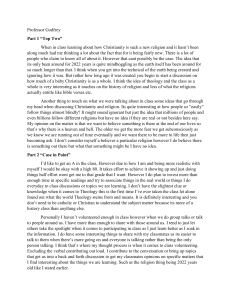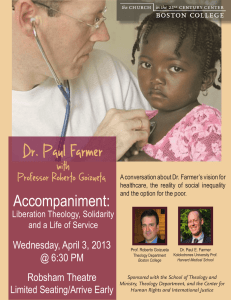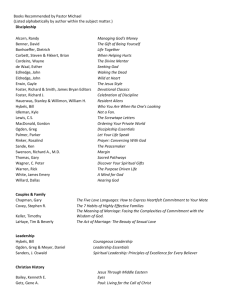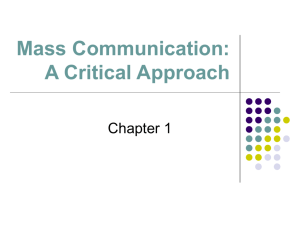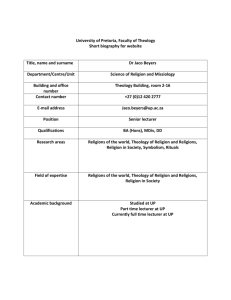Powerpoint - Crieff Seventh
advertisement
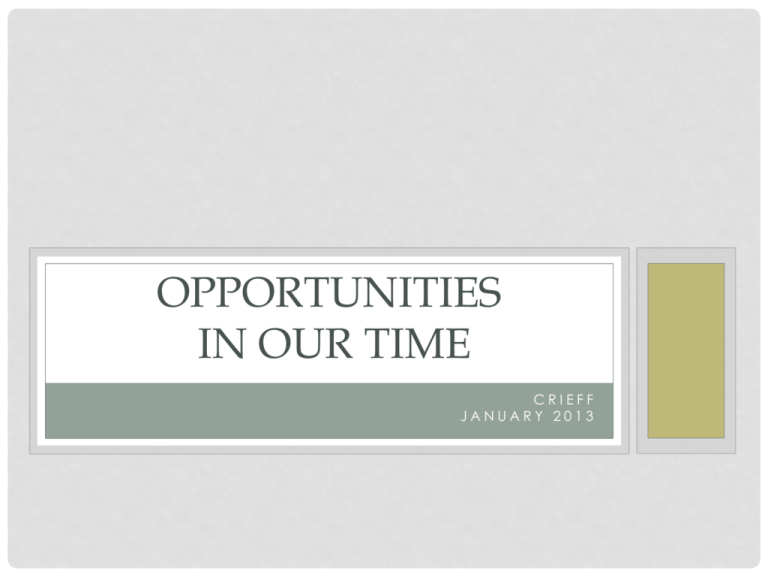
OPPORTUNITIES IN OUR TIME CRIEFF JANUARY 2013 Absolute Truth: A Person - a Life John 14:6: "I am the way and the truth and the life. No one comes to the Father except through me.” NEEDS AND VALUES • Paulien: • A sense of brokenness • Humility and autenticity • Search for identity and purpose • Need for community • Inclusiveness CHRISTIAN AND POSTMODERN VALUES 1. The value of holism 2. The value of diversity 3. The value of relationship 4. The value of spirituality 5. The value of community POSTMODERN CHALLENGES FOR THE CHURCH (1) • • • • • Spiritual – but vague Suspicious of institutions / religious experts Post-denominationalism Little interest in organic ecumenism Emphasis on local congregation POSTMODERN CHALLENGES FOR THE CHURCH (2) • • • • • Less (or no) interest in doctrine No absolute Truth – pick and choose Why christianity? Charismatic – Holy Spirit Angels, miracles POSTMODERN CHALLENGES / POSSIBILITIES FOR THE CHURCH (3) • Belonging before believing • Believing • Behaving • Belonging • Experiential – worship – praise • Cell • Church • Celebration • • • • Church discipline ? Interested in story of others Relational Slow to make commitment NEW EMPHASES IN THEOLOGY • Not focusing on prolegomena or existence of God • Not: Does God exist? But: What is God really like? • Theology describes experience • Strong role of community / tradition • Process theology / narrative theology / feminist theology KEY ISSUES • Truth: Is there a middle road between foundationalism and total relativism? • Uniqueness of Christianity/Christ? • Inspiration of the Bible? • Role of doctrines? • Balance reason / experience CHRISTIAN RESPONSE: BASICS • Faithful to gospel • Fully addressing contemporary situation • Must affirm propositional truth • Must affirm rational knowability • Christianity: ‘most cogent explanation for a whole range of facts in accordance with essential tenets of logic and criteria of evidence that are required for all critical thinking’ • Must use language that can be understood • Must be contextual POSTMODERNISM – IS IT ALL WRONG? 1. Strive for balance: 1. May be suspicious about comprehensive doctrinal systems, but there must be structure in what we believe. 2. Church – problems with bureaucratic and centralistic structure, but some rules and agreements are needed 3. Value of historical criticism remains, but Bible must also be read as vehicle for God’s voice. 4. Idea of value for each human being must not be lost.


